Years ago, SEGA put out a soccer management video game called Football Manager. The game was similar to the Franchise mode in the Madden franchise of video games, where players could focus more on how a team plays each game than the playing of the sport itself. I recently downloaded the 2022 Xbox version of Football Manager and the amount of things to think about was dizzying, maybe even too intense for what I was looking for in a video game experience.
Months ago, I read up on a board game version of these video games that was coming to tabletop. In time for the World Cup, Eleven: Football Manager Board Game (2022, Portal Games) has arrived. Eleven is the most thematic game to hit my table in months, and has some of the things I loved most about The Networks (2016, Formal Ferret Games) without the tongue-in-cheek approach.
Eleven is a game about soccer (or football, if you’re living anywhere outside of the US). It’s about the economics of managing a soccer club, putting the right players on the field, board room decisions and even getting sponsors for your team. There are a lot of fiddly bits to the process here, but this is the closest I have ever seen to a game about the business of sports that actually works.
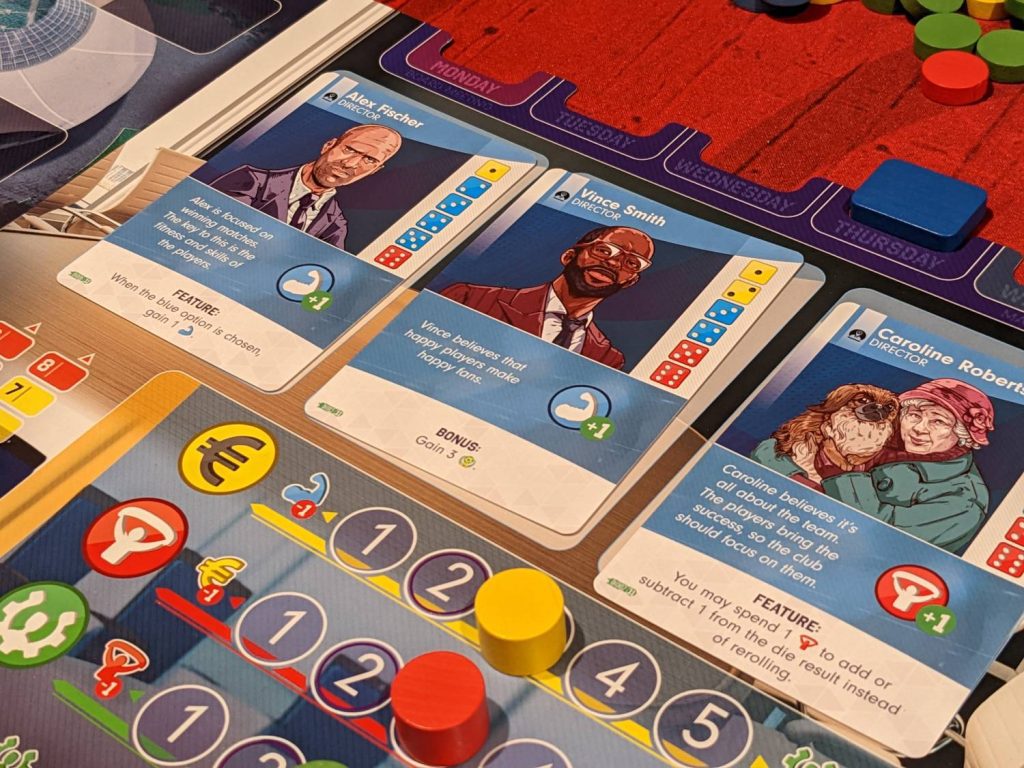
Clear the Table
By “clear the table” I don’t mean win all the games on your team’s schedule, although that is a way to ensure that you put yourself in position to win in Eleven.
I mean, literally clear your game table. You’ll need every last square inch of it if you want to give Eleven enough space to shine, particularly at the full player count of four.
Each player is given three large player boards: a stadium board to house your fans, upgrades and ads; a club board to keep track of your board directors, staff, maintenance costs, and production trackers; and a match board used to place your players, plot out each week’s game strategy, and house the players currently on your bench.
Just those player boards and all the components for each player is nearly too much to put on my large Game Topper. But then you also have to add three card markets for new staff members, new players (including a separate stack for adding rookies, known as “youngsters”, to your team), and new sponsors. Then you’ve got cardboard chits of all shapes and sizes scattered around the table, and resource tokens representing things like money, fans and training also in a pile.

Your table ends up being a mess during a game of Eleven. There’s no elegant way to keep things in their proper place, so you just have to embrace the chaos—sort of like the fan section at the old RFK Stadium during DC United games, for any MLS fans out there—when playing the game.
Much like the mess of stuff lying around, Eleven is a bit of a rules hog, particularly around the Matchday rules, which we will get to. The barriers for entry are high for a medium-weight game, which will absolutely turn some people off. I had to read this rulebook four times to gather everything that needs to be done and the edge rules around the matches.
If you can survive that, though, I think Eleven does a great job of giving players a taste of what it might be like to manage the business of a top-flight soccer organization.
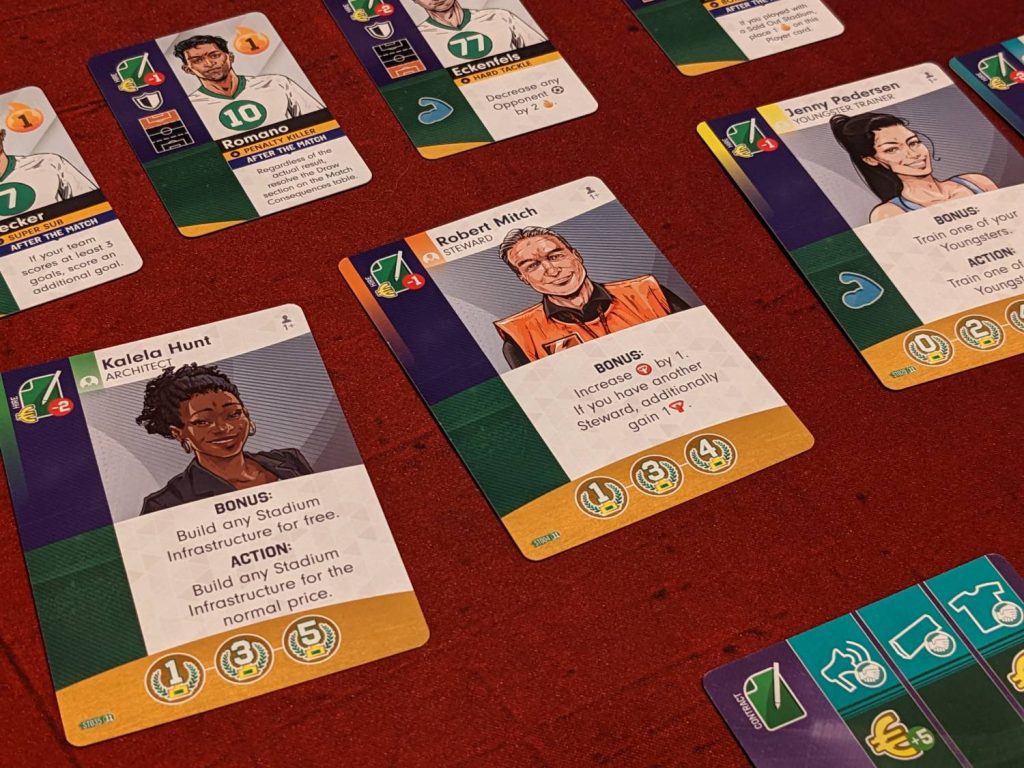
Weekdays are Easy, But Weekends are Something Else
A game of Eleven takes place over the course of six weeks, each with five steps.
Mondays are easy—produce resources like cash and training points based on your tracks on the club board to ensure you have resources to spend/allocate during the week. You’ll also roll a die to determine an event (usually negative) based on your board of directors, then you’ll jump into the heart of the week.
Tuesdays, Wednesdays, and Thursdays give each player a chance to take a single action. Hiring players, selling players, upgrading your stadium, and upgrading your office (for end-game points) are all options here. Over the course of the game’s 18 actions you’ll do each of these a couple times. One of the resources produced on Mondays can lead to bonus actions from your Board of Directors or other cards, but usually no more than 1-2 extra actions a week.
All of those actions matter because there’s so much to do when running a soccer club! Hiring players is vital to winning matches. Players come in standard transfer flair or youngsters. One of my favorite things about Eleven is hiring youngsters—all the youngster cards are faceless and nameless until they are trained (the flip side of each youngster card).
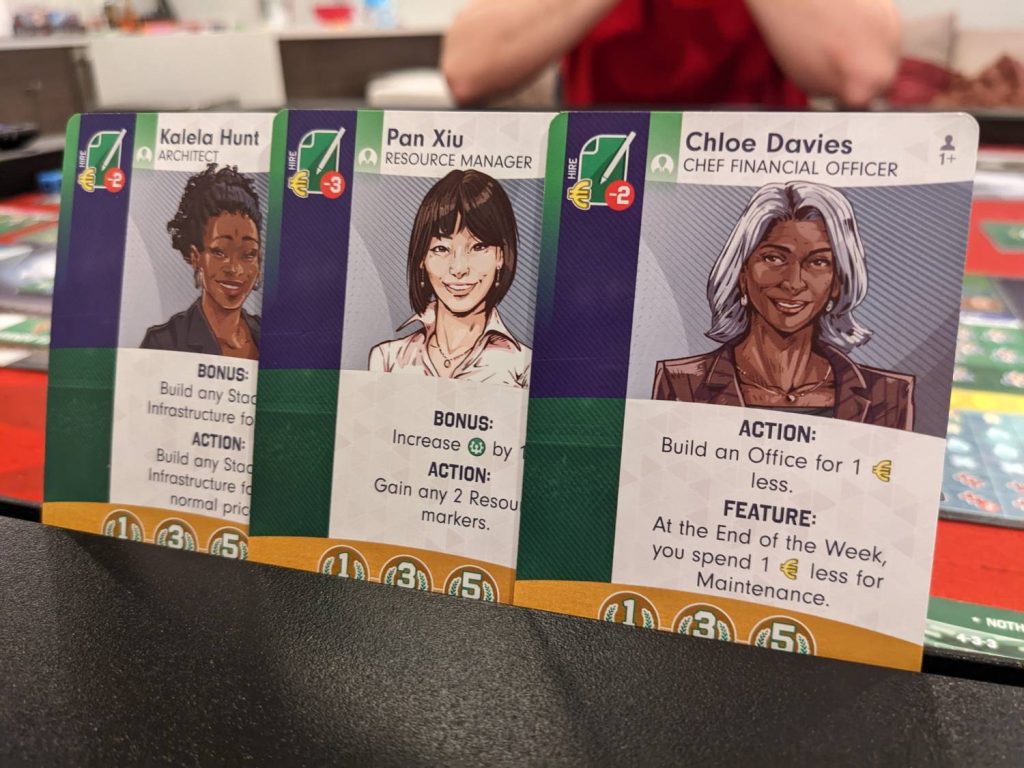
Once trained, it’s a wild mix of different things those rookies can turn out to be. Some of them are fantastic, some have special powers, and some of them aren’t very good! You never know what you’ll get with a rookie, exactly like in real life.
Sponsors are also quite interesting. Sponsor cards have three uses: they can be discarded for cash; they can be used to take either a one-time cash/income bonus or a special power; or they can become your jersey sponsor, allowing you to take both a cash/income bonus and a special power. (You only get one of those jersey sponsors per game.) The jersey sponsor even has a cute way of inserting into your stadium board so that you can always see the logo of your team’s shirt.
All the staff cards give you powers, and also aid in scoring at game end, thanks to the only gamified portion of Eleven that feels too much like a board game: a set collection element built into each of the game’s five color sets used on staff cards. Staff, your stadium, and players all add up to cost you maintenance fees at the end of each week, so making the right decisions to help with your team and add real value to how you play matches is crucial.
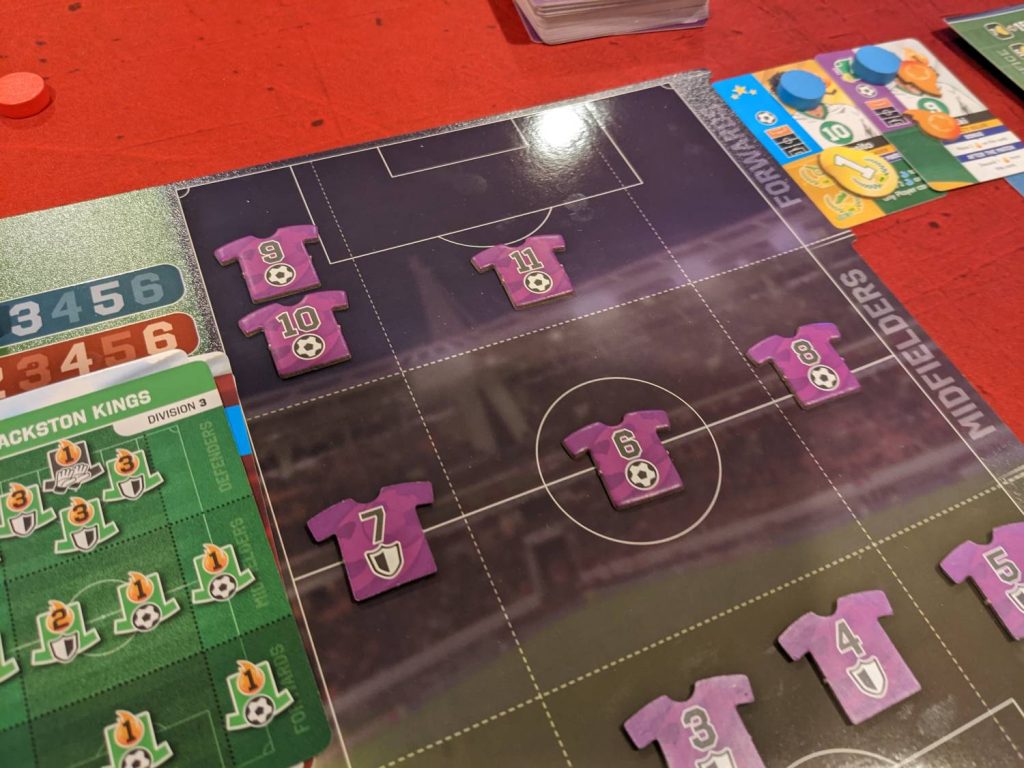
Oh, That’s Right…Matches!
At the end of each week, your team goes up against an opponent. At the end of the season, the team in first place in your league will earn a bunch of points, sometimes as much as half of their overall score. So, the soccer part is pretty important.
The soccer part is also pretty wonky.
That’s because each player plays against a deck of cards aligned with the division all players agree to face when a game of Eleven begins. I’ve tried the game against Division 3 and Division 3/2 opponents (easy), as well as Divisions 3/2 then 2/1 opponents (medium). Halfway through the game, you play against teams up one level, but it’s the match part that will leave some players dissatisfied with the Eleven experience.
Much like the video games I mentioned earlier, Eleven is not a robust soccer simulation. In fact, games of Eleven really come down to this: you play a tactics card to detail your formation–4-3-3, 3-5-2, all the standards you are probably used to if you are a soccer nut.
Then, you’ll activate players. In Eleven, all the athletes in the game have a strength of 1 whether they are playing offense or defense, and you’ve got a goalie who has a strength of 1 and can save one undefended shot from a strength 1 player each match. After that, things get tricky: you have athletes who have better stats that can be hired and then they cost one training resource token to activate.
This means that you’ll mostly have basic players playing in your match (especially in the first few rounds), with a couple of upgraded position players available too. All the upgraded cards have to be placed in the section of the field that is their specialty (forward, midfielder, defense). Further, each upgraded player is either an offensive or defensive player. Yes, this may mean that your best offensive players are playing on the defensive side of the pitch, which may feel like they are standing in the wrong part of the field!
Whether or not that makes sense to you isn’t important. What is important is that your opponent is a card, with a scouting report on the side you have to review before aligning your players into one of five zones—
Justin, this is sounding pretty complicated.
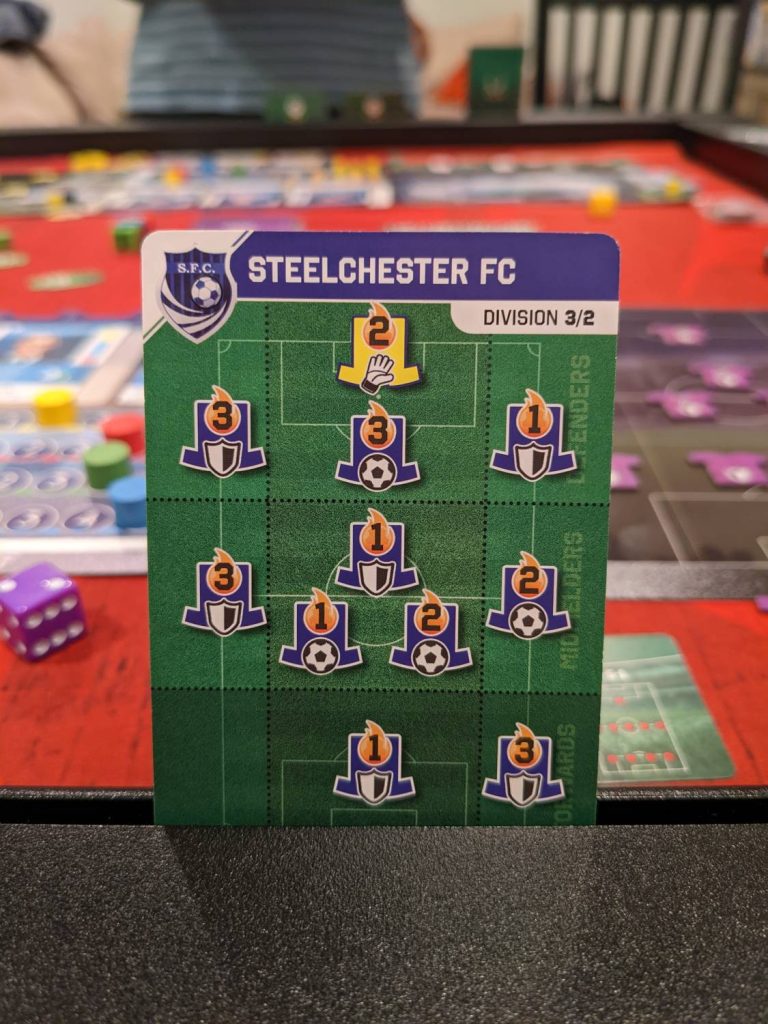
Fair, but there’s no getting around it. The match portion of Eleven is the “worst” part of the game, because it is overcomplicated to the point of comedy. During my first teach of Eleven, I breezed through everything except the matches, then just told the other players that we’ll just do a demo of the way matches play out during the first round of the game because it is so hard to describe it to another player.
Like your gaming table after setting up this beast, the mechanics behind the matches in Eleven are kind of a mess. Once you understand the system, things move relatively quickly. I have no idea why the designers didn’t just take a blanket approach to doing the math here: look at that opponent card, add up the total strength of the opponent’s defense versus your offense, and you score the difference. Do the same thing going the other way, and voila, you end up with a score.
In Eleven, this process is so hard to describe to other players. In writing, the rulebook dedicates five of its 30 pages to tell players how to successfully score matches. (Side note: why do so many games have 30-page rulebooks? Is that the new barrier to entry to prove your game is for “serious gamers”???)
Now, once you have the hang of it, matches are actually a fun puzzle. Positioning your players in just the right spots so that you can score goals while defending against anything written in the scouting report is the key to victory. (Sometimes, the scouting reports seemed to be OK, but not exactly accurate. This “fog of war” may lead to a win versus a draw in some cases, too.)
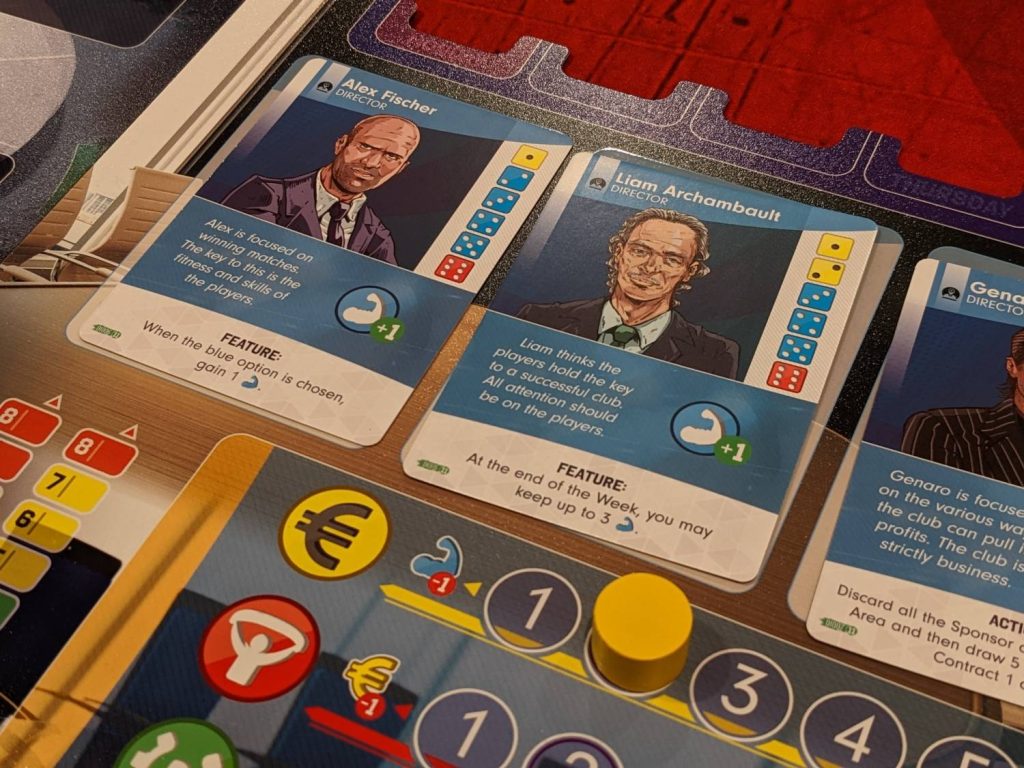
The Base Game is Enough, But…
I enjoyed my plays of Eleven, and it fills a very specific niche.
I’ve done four plays (two solo, one three-player game and one four-player game) and, generally, games play out the same way no matter how many people sit at the table. In part, that is because it will be rare that someone snipes the best cards from the market—there’s plenty of everything to go around. And you need a mix of players for your team just like everyone else. For the Mondays and Matchday portions, the game is basically multiplayer solitaire.
Tuesday through Thursday actions are slowed by having to constantly refresh the market. But save for someone occasionally taking that red staff card that you were hoping to buy to complete a set, you will rarely feel that your plans have been derailed. That means that the solo scenarios (there are six in the box, but you could just play Eleven straight up without those scenarios) are interesting challenges if you want to speed up play. I think playing this solo or with two players is just right.
Getting a macro view of running a club, in the Monday and Tuesday through Thursday actions, is a good time in Eleven. Matchdays are going to be the breaking point for some players. You will either embrace learning an intricate and somewhat randomized puzzle system or you won’t. Just know that no matter where you land, teaching the Matchday elements in Eleven is almost like teaching a separate, rules-heavy Euro. In addition, managing the updated league standings is almost as fiddly as the design of the matches thanks to an opponent tracking system that is less than ideal.
If you need even more Eleven, Portal has you covered with not one, not two, but FIVE expansions adding bits and pieces to each play. While I have no idea who has the table space for all that, I like that there are already pieces that can be added for hardcore soccer junkies. I think the base game has plenty, but I do think there’s room for adding different modules to your stadium, different events, and different staff card abilities to keep play fresh.
Eleven is good, and it is tough. Because your starting team is so bad, working to slowly upgrade it and your production levels makes for a solid challenge. You are probably not going 6-0 in your first few seasons, and “cakewalk” is not a word you’ll use while playing. The difficulty feels like the right fit and I’m excited to play this solo while the World Cup games are playing in the background!


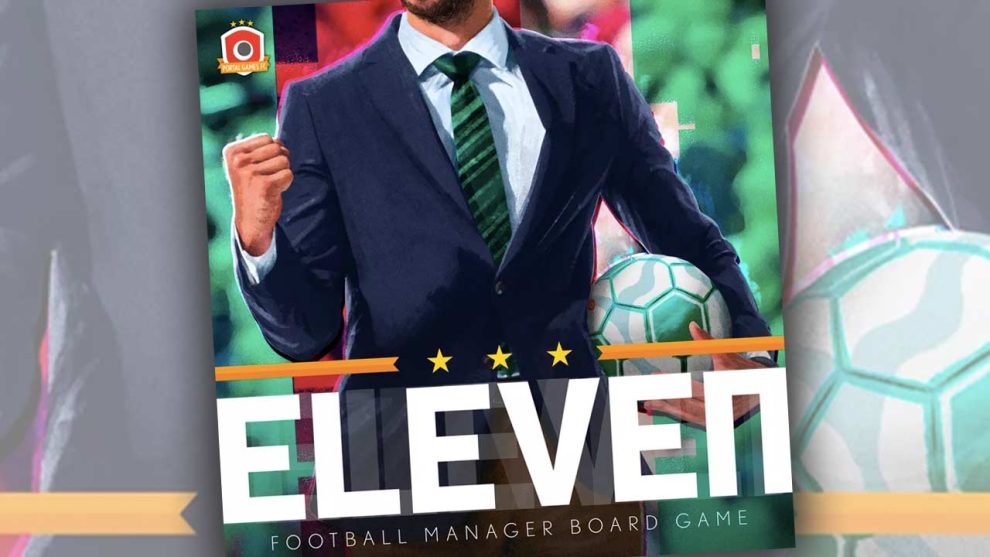









Add Comment